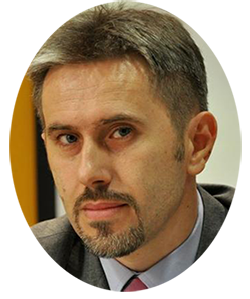Interview with expert Darko Tot
Darko Tot has more than 10 years of experience in leadership development. We wanted to know more about the biggest challenges for organizations in Serbia at the moment, intercultural awareness and empathy and the future of classroom trainings.
According to your opinion: What is currently the biggest challenge for organizations in Serbia?
I would list two.
Due to quite low average salaries and high unemployment rate, it is quite easy to find new employees for the majority of positions. Very often the approach is that it is easier (and less expensive) to replace someone than to invest into his development, to dedicate time and effort, to coach etc.
On the other side, due to the opening of new positions, we were eye-witnessing that some positions were having extremely fast expansion. Someone started as a salesperson in one company, then the new company entered the market so s/he applies for a supervisor position and, due to some experience, got it. And then a new company came looking for a sales manager, so s/he appeared to be a good candidate. Soon after that, that person became, for example, sales director (similar can be applied to HR, etc.), with just a couple of years of experience. Now, being there it is difficult to acknowledge that development was too fast (actually I hear that only from one person in my about 15 years of experience). And this situation creates a lot of difficulties…
“Nice to have” or a strategic factor of success: How do you experience that Serbian organizations view (international) leadership development at the moment and how will that be in the future?
When I started to work in leadership development, back in 2003, participation in trainings was seen more as “punishment” and a sign that “I must be doing something wrong” than an opportunity to improve and develop.
The situation has changed a lot ever since.
However, my impression is that most of the companies are still on the level “nice to have it” or “when others do it, then we will do it, too”. Although it is not necessarily the wrong starting point, it appears in many cases that development programs are not well prepared, goals are not clear, everything is done in the last minute, just to tick the box. The selection of the participants is either too narrow or too wide. As a result, occasionally, in some companies, you might hear “training, oh not again please”.
The future will depend on a couple of factors out of which I would highlight the two: quality of HR people in the companies and quality of providers. The first one plays the key role in preparation, development of internal processes, creating a proper climate, understanding costs of both training and non-training and available options. The second one is interlinked very much with the first one. Simply quality on the demand side will set up the quality of the supply side. Or, to paraphrase famous Lewis Carroll quote: If you don’t know what you want from the training, any training will get you there.
You are a trainer and professional for many years already. According to your experience: What are the differences between development measures (trainings, digital learning etc.) in Serbia and, for example, in Austria or Germany?
I would say that it is the approach, attitude and consequently impact. My impression is that when working with participants coming from Austria or Germany investment into development is seen as critical for their personal success and therefore they are showing a higher level of commitment. This might be also linked with better understanding and existence of wider opportunities on the market and better preparation of development measures. At the same time, there are also bright examples in Serbia, so everything is having a strong cultural component.
What is most important when working as a trainer on an international level and what does it take to be an international training and development guide? What are typical challenges and do you have any tips?
Readiness to learn and constantly develop, openness to new experiences, flexibility to understand and approach different personality styles, the capability to motivate people, to help them in becoming better persons and professionals.
And all these elements have their positive and challenging side. The biggest risk is to think that you know it all and to stop focusing on the people in front of you. All in all, you simply have to love it, to enjoy working with and for the people.

The most important thing when working as an international trainer? Motivate people, help them in becoming better persons & professionals: you simply have to enjoy working with and for the people
International leadership development is a lot about intercultural awareness and empathy. For a training professional doing a module of a leadership program in Serbia: What would you as the expert recommend? To what shall he/she pay special attention and what is important? What are your tips for success in order that the training is really beneficial for everyone?
I have learned with one of my first clients that you are not the expert just because you say so or because you have some internationally recognized certificates. One of the things I have learned during my study at the Chartered Institute for Personnel and Development (CIPD) in London is that as a professional trainer you need to “enter into their shoes”.
Being able to establish head-to-head and heart-to-heart communication with an individual and a group is the prerequisite of the success. And always to be aware that you are there for them and not the other way around. It is not about you being smart but helping them to do what they are doing faster and better.
Once people recognize that, you are on your way to succeeding.
What do you think of the following: In times of unstoppable digitalisation – Are classroom trainings – which means face-to-face – still up-to-date or will they vanish soon? And why/why not? How to deal with that situation?
My humble opinion is that we should invest in the new forms, without abandoning the traditional ones. Technology development is faster than evolution dynamic. If, just because we have new modern ways of communication, we stop meeting people in the real world, having coffee with them etc. – then we will face many psychological challenges that a training or coaching will hardly be able to solve.
As new modern cars should not prevent walking, possibility to see every corner of the planet from our sofa shouldn’t replace visits to new places or computer sports games shouldn’t stop real sports activities, also digitalisation should not lead to the end of face to face trainings. After all or before all, we are social beings and ultimately we like meeting other people, discussions, interaction etc.
According to your opinion: What will be the biggest challenge for the training & development industry in the next 5 to 10 years?
In the era in which we are receiving so much information per day everybody knows or have read something about almost any topic no matter if this is climate change, economic development, time management or leadership.
Although superficial, such knowledge creates the impression, yes I know that. And as a result, I believe that we will have more and more of this “I know it all” approach. Overcoming that and motivating people to really invest in themselves and go beyond the first page on Google or 2 minutes video on YouTube will be more and more difficult. Already today we have to deal with “I want it all and I want in now” and we all know that training is not that sort of the game. It is not a short sprint, it is rather a marathon.

Our interview partner
Darko Tot has more than 10 years of experience in international leadership development. His passion is to meet new people, hearing their personal stories and learn more about their jobs. He likes to work in the leadership development field because it gives the biggest opportunity to influence in a broader context, to provoke people to make changes and to achieve some impact.
His motto? When started to work and opening my own consultancy business the motto set up was “Your success is our mission!” And that’s how I act ever since then (And, by the way, it sounds much better in Serbian)
What serves you next?
Leadership development in Greece
International training and development expert Sotiris Karagiannis tell us more about the current situation of leadership development in Greece, the typical challenges at international leadership trainings and much more.
Leadership development in Brazil
Silke Körner is originally from Germany but worked in Brazil as a trainer and L&D consultant for many years. In this post, she reveals how she experienced leadership development and training in Brazil and how digitalization and leadership 4.0 are influencing the country.
International leadership development with Mondi
Mondi’s new leadership training program will be launched in the fall of 2017 and will focus on intercultural leadership and the preparation of leaders for international challenges. We talked to the head of The Mondi Academy, Birgit Höttl, and our MDI Training & Development Consultant, Helena Gutierrez about the program.




